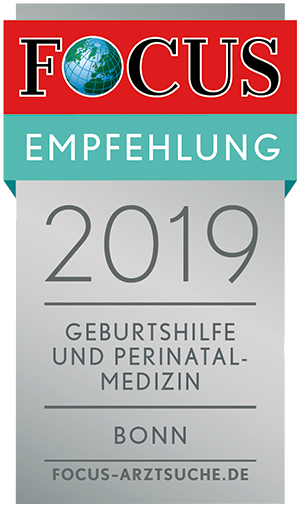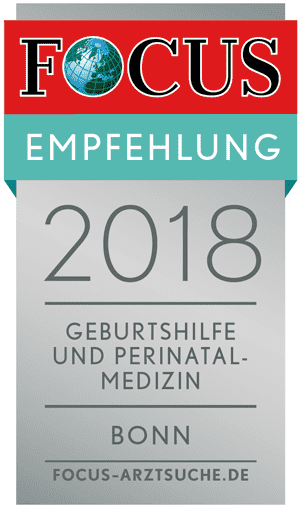
Good to know!
Below you will find a list of the questions that we are frequently asked. To make things clearer, the questions are divided up into three categories:
- making appointments,
- the appointment and
- after the appointment at our practice.
Frequently asked questions about making appointments:
- I would like to make an appointment. What information do I have to give?
- I am unable to attend the appointment. What do I have to do?
- Will the statutory health insurance institution pay the costs for my examination?
I would like to make an appointment. What information do I have to give?
To make appointment well attuned to your wishes we need following information:
- When was the first day of your last period and how long is your menstrual cycle (calculated from the first day of your last period until your next period)?
- If you are pregnant, when is your expected due date?
- Has the due date been changed by your gynaecologist in the meantime?
- Are you having a single or multiple pregnancy?
- Which examination are you supposed to have?
- Is your pregnancy high-risk?
- Has your gynaecologist detected any abnormalities?
- What`s the name of your gynaecologist?
- Do you have a certificate of referral?
- Are you self- paying or do you have private insurance?
- Can you please give us a telephone number under we can easily contact you (mobile, private and/or work landline)?
I am unable to attend the appointment. What do I have to do?
Please inform as soon as possible. You should make another appointment at the same time.
The telephone number for our medical practice is + 49 (0) 228 280 93 00
Will the statutory health insurance institution pay the costs for my examination?
The statutory health insurance institution pays the costs incurred for consultation, examination and laboratory diagnostics if these are medically necessary. Only in this case is your gynaecologist allowed to refer you to our practice for further examinations.
However, you can naturally use our services as a non-contractual service. In this case, you will receive the corresponding private medical bill, based on the German schedule of medical fees (GOÄ). Below you will find an overview of the services that are frequently requested at our medical practice:
First trimester screening (11+0 to 13+6 weeks of pregnancy)
Costs (including laboratory costs): 300 Euro
Detailed fetal scan (20+0 to 23+0 weeks of pregnancy)
Costs: 300 Euro
We are happy to answer your questions about the costs of the examination and the costs of other examinations as part of individual health services
(IGeL services), as well as private medical bills. You can contact us by telephone on + 49 (0) 228 280 93 00
Frequently asked questions about your appointment at our practice:
- What documents should I present at the examination?
- Can I bring my toddler along to the appointment?
- How long does an examination appointment last?
- Can I apply body care products on the morning before the ultrasound appointment or does it affects the results of the ultrasound?
- Are there certain things that I shouldn’t eat or drink on the day of the ultrasound examination?
- Are ultrasound examinations associated with risks for me and my unborn baby?
- For example, If I don’t want to know the sex of the baby, or some other information about the baby, when do I have to say it?
- How many ultrasound examinations may be performed during a pregnancy?
What documents should I present at the examination?
- Registration form for patients
- Pregnancy record
- Your health-insurance card
- A valid certificate of referral, if you are not insured privately
- Previous medical documetation, if existing
Can I bring my toddler along to the appointment?
During the examination, we would like to be able to concentrate on you alone. That is why we kindly ask you to bring along small children only if accompanied by another adult. Please note that long examination appointments can be exhausting for young children.
How long does an examination appointment last?
We plan a lot of time for the examination and counselling our patients. Even though we want to keep to appointments as arranged, in a case of abnormal ultrasound result we want to be able to counsel our patients without time pressure and perform further investigations if necessary. So please understand if you have to wait for your appointment.
When we make appointments, we are unable to foresee how intensive the consultation of each individual patient will be. Based on experience, you should allow at least two hours for an appointment at our practice.
Can I apply body care product on the morning before the ultrasound appointment or will it affect the results of the ultrasound?
Beauty products such as body lotion interfere with the ultrasound signal, which has a negative effect on the quality of the image. To obtain the most accurate investigation results possible, we request that you stop moisturising your abdomen a day before your ultrasound examination.
Are there certain things that I shouldn’t eat or drink on the day of the ultrasound examination?
Are there certain things that I shouldn’t eat or drink on the day of the ultrasound examination?
In general, you should drink a lot during your pregnancy. We recommend one and a half to two litres a day. Drinking a lot on the day of the examination can be beneficial, because the foetus is easier to see if there is enough amniotic fluid.
Are ultrasound examinations associated with risks for me and my unborn baby?
Ultrasound examinations are harmless for pregnant women and their unborn child. During the examination, sound waves oscillate at a frequency that the human ear cannot hear. Obstacles, such as tissue, reflect these waves so that they can be picked up by the receiver. It is from this information that the ultrasound image is eventually made up.
For example, If I don’t want to know the sex of the baby, or some other Information about the baby, when do I have to say what I want to know and what I don’t want to know?
Everybody has the right not to be given information and we respect that. Before an ultrasound examination, we will give you detailed information and advice about what the examination will involve the possible results and the consequences. Using methods from prenatal medicine a fetal illness or a developmental disorder may be detected in a previously normal pregnancy. This may result in further treatment steps such as amniocentesis and genetic diagnostics.
If you do not want to find out certain results of the investigation: such as the sex of the baby, for example, please let us know in advance.
How many ultrasound examinations may be performed during a pregnancy?
On average, women will have four to five ultrasound examinations during a normal pregnancy. However, if there is a risk to the mother or the unborn baby or if they are in a dangerous situation, the gynaecologist will decide whether further examinations are necessary. The ultrasound examinations are only for the safety of mother and the child.
Frequently asked questions after an appointment at our practice:
- When and how will I find out the results of the examination?
- After my examination at Dr. Reihs practice I found a feedback form in my pregnancy record. What do I do with it?
When will I be informed out the results of the examination?
We will inform you of the results straight after the examination. With your permission we will also promptly send a examination report to the gynaecologist who is treating you.
You will get the results of invasive diagnostics as well as the first trimester screen, for which laboratory results are necessary, in person, not later than one day after the examination.
The results of cytogenetic testing will be available within 10 days after diagnostic procedure (Amniocentesis, chorionic villi sampling). In urgent cases, we perform a rapid test to get the results next day.
After my examination in Dr. Reihs’ practice, I found a feedback form in my pregnancy record. What do I do with it?
This feedback form is used for quality control purposes at our medical practice. We therefore request that you complete this form after the birth of your baby and send it back to us. Naturally we will protect your data and use this information for internal purposes only. We would like to use feedback information to make sure that we meet our own quality standards.


